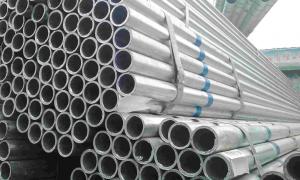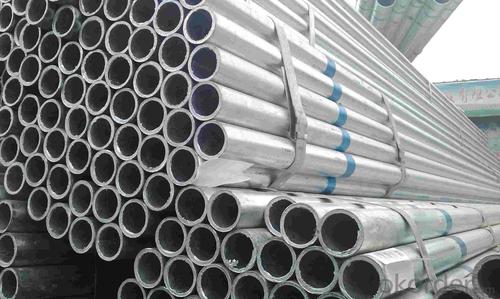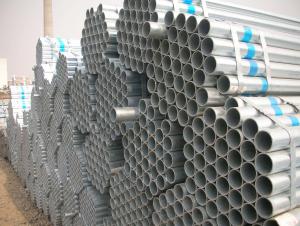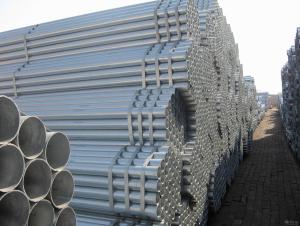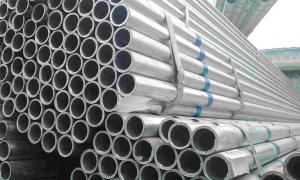America Standard A53 Q215 150g Hot Dipped or Pre-galvanized Pipe
- Loading Port:
- Tianjin
- Payment Terms:
- TT or LC
- Min Order Qty:
- 45 m.t.
- Supply Capability:
- 7000 m.t./month
OKorder Service Pledge
OKorder Financial Service
You Might Also Like
1、Structure of Pre-galvanized Galvanized Pipe America Standard A53 Q215 150g Hot Dipped or Pre-galvanized Pipe:
The surface of Pre-galvanized Galvanized Pipe America Standard A53 Q215 150g Hot Dipped or Pre-galvanized Pipecan increase the corrosion resistance of the steel tube, prolong service life. Galvanized pipe is widely used, in addition to water, gas, oil and other general low pressure fluid pipelines. It is also used in the petroleum industry, especially for offshore oil field of oil well pipe and oil pipe, chemical, coking equipment of oil heater, condensation cooler, coal run oil exchanger tube, and trestle pile, the mine tunnel support frame tube.
2、Main Features of Pre-galvanized Galvanized Pipe America Standard A53 Q215 150g Hot Dipped or Pre-galvanized Pipe:
• High manufacturing accuracy with standard
• High strength and stable
• Good visual effect
• Reasonable price
• Small inertia resistance
• Strong heat dissipation ability
3、Pre-galvanized Galvanized Pipe America Standard A53 Q215 150g Hot Dipped or Pre-galvanized Pipe Specification:
Standard | GB, DIN, ASTM ASTM A106-2006, ASTM A53-2007 |
Grade | 10#-45#, 16Mn 10#, 20#, 45#, 16Mn |
Thickness | 1 - 33 mm |
Section Shape | Round |
Outer Diameter | 21 - 610mm |
Place of Origin | Tianjin, China (Mainland) |
Secondary Or Not | Non-secondary |
Application | Hydraulic Pipe |
Technique | Cold Drawn |
Certification | API |
Surface Treatment | factory state or painted black |
Special Pipe | API Pipe |
Alloy Or Not | Non-alloy |
Length | 5-12M |
Outer Diameter | 21.3-610mm |
Grade | 20#, 45#, Q345, API J55, API K55, API L80, API N80, API P110, A53B |
Standard | ASME, ASTM |
1) Material:20#(ASTM A 106/A53 GRB.API5LGRB,GB),45#,16Mn,10#.
2) Specification range:OD:21.3-610mm,WT:6-70mm,length:6-12m or according to the requirement of clients.
3) Excutive standards:GB,ASME API5L.ASTM A 106/A53,Despite of the above standards,we can also supply seamless steel pipe with standard of DIN,JIS,and so on,and also develop new products according to the requirements of our clients!
4) Surface:black lacquered,varnish coating or galvanized.
5) Ends:Beveled or square cut,plastic capped,painted.
6) Packing:bundles wrapped with strong steel strip,seaworthy packing.
4、Packaging & Delivery
Packaging Details: | seaworthy package,bundles wrapped with strong steel strip |
Delivery Detail: | 15-30days after received 30%TT |
5、FAQ of Pre-galvanized Galvanized Pipe America Standard A53 Q215 150g Hot Dipped or Pre-galvanized Pipe:
①How is the quality of your products?
Our products are manufactured strictly according to national and internaional standard, and we take a test
on every pipe before delivered out. If you want see our quality certifications and all kinds of testing report, please just ask us for it.
Guaranteed: If products’ quality don’t accord to discription as we give or the promise before you place order, we promise 100% refund.
②How about price?
Yes, we are factory and be able to give you lowest price below market one, and we have a policy that “ for saving time and absolutely honest business attitude, we quote as lowest as possible for any customer, and discount can be given according to quantity”,if you like bargain and factory price is not low enough as you think, just don’t waste your time.Please trust the quotation we would give you, it is professional one.
6、 Pre-galvanized Galvanized Pipe America Standard A53 Q215 150g Hot Dipped or Pre-galvanized Pipe: Images:
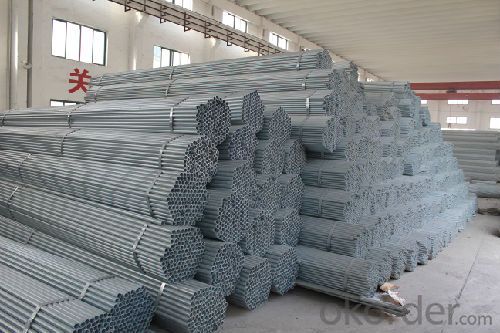
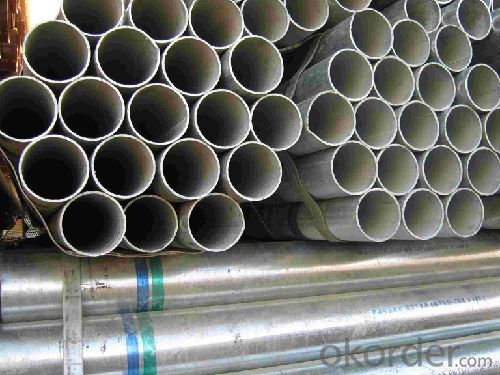
- Q: What is the cost of steel pipes compared to other pipe materials?
- The cost of steel pipes compared to other pipe materials can vary depending on several factors including the size, grade, and availability of the specific pipe materials. However, in general, steel pipes tend to be more cost-effective compared to other pipe materials. This is because steel is a widely available and versatile material that can be easily manufactured and fabricated into various pipe sizes and shapes. Compared to materials like copper, stainless steel, or plastic, steel pipes are often more affordable due to their lower manufacturing costs. Additionally, steel pipes have a longer lifespan and superior durability, which makes them a cost-effective choice in the long run. They are resistant to corrosion, withstand high pressure and temperature, and can be used in a wide range of applications including plumbing, construction, and infrastructure projects. It is important to note that the cost of steel pipes can still vary depending on market conditions, demand, and location. However, overall, steel pipes are generally considered to be a cost-effective option compared to other pipe materials.
- Q: How are steel pipes used in the manufacturing of bicycles?
- Steel pipes are commonly used in the manufacturing of bicycles as they provide strength, durability, and rigidity to the frame structure. The pipes are typically used to construct the main frame, handlebars, seat post, and fork, ensuring a sturdy and reliable bicycle.
- Q: Can steel pipes be used for underground electrical conduits?
- Yes, steel pipes can be used for underground electrical conduits. Steel pipes are durable, strong, and resistant to external forces, making them suitable for protecting electrical wiring in underground installations. Additionally, steel pipes offer excellent corrosion resistance, ensuring the longevity and safety of the electrical system.
- Q: What are the different sizes of threads available for steel pipes?
- The different sizes of threads available for steel pipes include standard pipe threads such as NPT (National Pipe Taper) and NPS (National Pipe Straight), as well as metric pipe threads like MPT (Metric Pipe Taper) and MPS (Metric Pipe Straight). These sizes can vary from 1/8 inch all the way up to several inches in diameter, depending on the specific application and industry requirements.
- Q: What are the different types of coatings used for steel pipes?
- There are several different types of coatings used for steel pipes, including epoxy coatings, polyethylene coatings, coal tar enamel coatings, and zinc coatings.
- Q: Are steel pipes suitable for fire protection systems?
- Yes, steel pipes are suitable for fire protection systems. They are highly durable and have excellent resistance to heat and fire. Steel pipes also have superior strength, making them suitable for carrying water or other fire suppressants at high pressure. Additionally, steel pipes have a long lifespan and are able to withstand different environmental conditions, making them a reliable choice for fire protection systems.
- Q: What is the role of steel pipe manufacturers in sustainable development?
- The role of steel pipe manufacturers in sustainable development is crucial as they play a significant part in promoting environmentally-friendly practices. Steel is a highly recyclable material, and manufacturers can contribute to sustainable development by using recycled steel to produce pipes. Additionally, they can implement energy-efficient production processes, reduce waste generation, and adopt responsible sourcing practices. By prioritizing sustainability, steel pipe manufacturers can minimize their environmental impact and contribute to the overall goal of achieving a more sustainable future.
- Q: How are steel pipes used in the manufacturing of ships?
- Steel pipes are used in the manufacturing of ships for various purposes, including structural support, fluid transportation, and ventilation systems. They are commonly used to create the framework of the ship, providing strength and stability. Additionally, steel pipes are used to transport fluids such as water, oil, and gas throughout the vessel. They are also utilized in the ship's ventilation system to ensure proper air circulation and maintain a safe environment for crew members.
- Q: What are the different types of steel pipe coatings for chemical processing plants?
- There are several types of steel pipe coatings commonly used in chemical processing plants, including epoxy, polyethylene, polyurethane, and fusion-bonded epoxy (FBE) coatings. Each coating offers different benefits such as corrosion resistance, chemical resistance, and enhanced durability, which are crucial for protecting steel pipes against the harsh conditions and corrosive substances found in chemical processing plants.
- Q: How are steel pipes manufactured?
- Steel pipes are manufactured through a process called pipe manufacturing, which involves several steps. First, raw materials such as steel plates or coils are formed into cylindrical shapes. These shapes are then welded together to create a seamless or welded pipe. After welding, the pipes undergo heat treatment to improve their mechanical properties. Finally, the pipes are cut, inspected, and coated with protective layers before being ready for various applications.
Send your message to us
America Standard A53 Q215 150g Hot Dipped or Pre-galvanized Pipe
- Loading Port:
- Tianjin
- Payment Terms:
- TT or LC
- Min Order Qty:
- 45 m.t.
- Supply Capability:
- 7000 m.t./month
OKorder Service Pledge
OKorder Financial Service
Similar products
Hot products
Hot Searches
Related keywords
